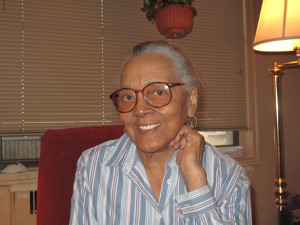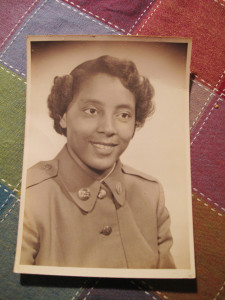by Antonina Zielinska
Looking forward to enjoying the comforts of home for the first time since she joined the Army, Private Sarah Keys sat patiently on the long bus ride from her assignment in Fort Dix, N.J., to her hometown of Washington, N.C.
Her parents would make a celebratory meal, and on Sunday, the family would go to church together.

The bus driver made a pit stop after midnight in Roanoke Rapids, N.C. Private Keys did not think much of what seemed to be a routine ticket check. When it was her turn to show her ticket, she did not think too much of the driver’s suggestion to change her seat.
“I’m comfortable where I’m sitting,” she answered him, finding it only slightly odd that he did not collect her ticket.
When the bus driver finished collecting tickets from all the other passengers, he came to the front and made an announcement telling the passengers that there needed to be a bus change. He asked everyone to get off the bus to switch, except for the woman who was refusing to change her seat. Since she didn’t want to move, she could stay there now.
Starting to realize the severity of the situation, Private Keys, who was dressed in uniform in accordance with Army expectations, started to leave with the other passengers. She did not want to be left alone on the bus.
The year was 1952, and Private Keys was a black woman in the middle of a seating arrangement dispute on an interstate bus in North Carolina. It was eight years after the Supreme Court ruled 7-1 in Morgan vs. Virginia that segregation on interstate buses was illegal.
Private Keys walked off the bus that night of her own free will. However, she was not able to enter the bus that would take her home. Instead, the police came and arrested her for disorderly conduct.
She was jailed for 13 hours. Although the police told her that they would contact her family, her family said they did not know why she came home later than planned.
Private Keys was told that she would be set free if she could pay the $25 fine, which, accounting for inflation, would amount to a little over $210 today. The young private did have enough cash on her and was escorted to the bus station. She was told what seat to take and to not move until she reached her destination.
When she arrived home, she was not initially eager to recount her experience. She just wanted to put the whole affair behind her. It was her father who encouraged her to stand up for herself. The Keys family was no stranger to standing up for justice.
Her father, David Keys, served in the Navy during World War I. When he came back home to North Carolina, he was a convert to Catholicism and the only black Catholic in his hometown. He eventually came to know Father Charles Hennigen, who came to minister to a couple of white Swiss Catholic families living in the region.
After becoming familiar with the young black Navy veteran, Father Hennigen asked David Keys if he thought there was enough interest in his community to warrant a Catholic school. David Keys assured him that there was.
After receiving episcopal permission, David Keys started teaching catechism to local children at the home of his Baptist parents just in time for Christmas. This led to the establishment of Mother of Mercy parish in 1927, which consisted of a school run by nuns of the Immaculate Heart of Mary. Mass was held in two of the school’s classrooms. A church building was erected in 1948. The parish, but not the school, remains open today.
After serving an instrumental role in spreading Catholicism in Washington, N.C., David Keys provided for his wife and seven children with his trades of farmer and cement finisher. His work as a cement finisher required him to travel on interstate buses. Therefore, he was familiar with the dynamics of bus seating. He advised his daughter to always take direct routes when traveling north to south.

Even though Private Keys did heed her father’s advice, she was charged with disorderly conduct when she refused to change her seat coming home in 1952. Her father helped her find a way to go back to find out what was so disorderly about her conduct. That path eventually led to a battle in a lower court, which she lost.
The family then sought help from the National Association for the Advancement of Colored People, which put Dovey Johnson Roundtree and her partner Julius Robertson on the case. After three years of court battles, false accusations and other hardships, Sarah Keys Evans, who was now married George Evans, could finally have some closure.
On Nov. 7, 1955, the Interstate Commerce Commission (ICC) came to a decision in the Keys vs. Carolina Coach Company case. It ruled racial segregation on interstate buses a violation of the Interstate Commerce Act.
However, the fight for protection from racial discrimination on public transportation was not over. Less than a month after Keys won the ICC case, Rosa Parks brought racial segregation to the forefront of the nation’s attention when she refused to give up her seat on a bus. It took another six years before the ICC would enforce its own ruling in the Keys vs. Carolina Coach Company case.
After three years of fighting for her rights, Keys Evans withdrew from the public eye and built a successful career in hair styling. She lived with her husband in Brooklyn where they attended Our Lady of Victory Church, Bedford-Stuyvesant, which is now part of St. Martin de Porres parish. Although her husband is now deceased, she is still a member of the church.
Editor’s Note: To learn more about Sarah Keys Evans, read her biography, Take a Seat – Make a Stand: A Hero in the Family, written by Amy Nathan and published by iUniverse, Inc. The book is geared toward grade school children.
***
This article reflects a correction of the year in which Private Keys refused to change her seat.

This is an event that I am so happy to learn about and expose to others. After reading, I highlighted her history during a Black History presentation last night at HCC in Weldon, NC with many individuals from neighboring Roanoke Rapids, NC. It was much appreciated and very well received by 4H Club members and their advisors and parents who were totally unaware of the important role Mrs. Evans played in the Civil Rights Movement and the fight to make segregation on interstate buses/coaches illegal. Would love to meet and/or this icon who paved the way!!! I would THANK YOU😘